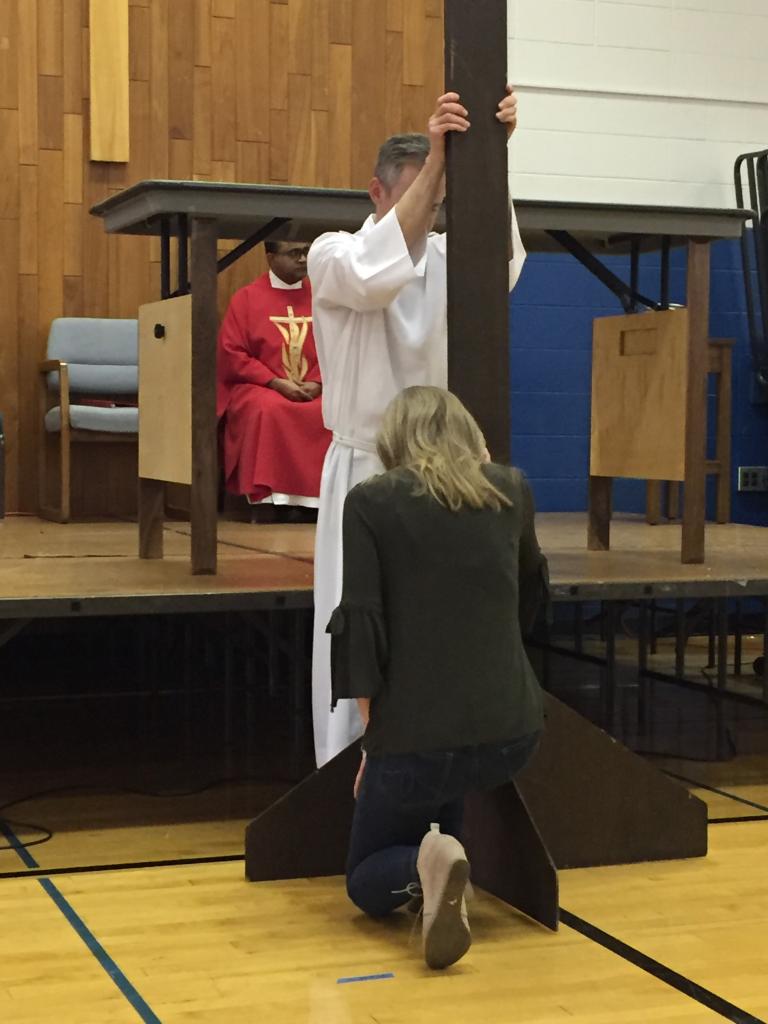So it’s Easter morning. The bread is in the breadmaker, the kids have finished their (chocolate) Easter egg hunt (yes, even though the oldest is now 15), my youngest has made crescent rolls (from a tube) which are now baking. No big extended-family Easter celebration, as we were at my parents’ not long ago and weren’t up to a drive this weekend, and my oldest son is playing trumpet in the teen choir, besides. But the teen choir mass is at 11:30, so now I’ve got a bit of time to relax before getting the roast ready, which hopefully will bake while we’re at church without getting overdone (though I’m second-guessing my planning yesterday: I went to the Easter Vigil, but left before the Liturgy of the Eucharist, knowing I’d be back today; if I’d just stuck around, I’d be able to leave church early today and finish up “Easter Lunch*”).
(Yes, it’s “Easter Lunch”, because my German-born husband can’t see his way to accepting calling a midday meal “dinner.”)
Now, you’ll notice that I haven’t been blogging very much in the way of Eastery or Lenteny reflections. It’s just not in my skill set, so I figure my fellow bloggers are giving you lots of content here.
But a few quick thoughts:
I was disappointed to read that the My Big Fat Greek Wedding sequel got such poor reviews, because I was planning on making this a Date Night movie. But I’m reminded of the Easter scene in the movie, in which the characters greet each other with “Christ is risen”/”He is risen indeed.” At least that’s how I remember it – because I thought it was cool that in the Greek community, this very religious greeting is still there.
On the other hand, I was surprised that there was little acknowledgement of Easter in today’s morning paper, no warm-and-fuzzy Easter editorial. Maybe there never really has been — since you can’t “secularize” the Easter message in the same way as you can transform Christmas into vaguer messages of hope and goodwill. You either believe in the Resurrection, and the fact that Jesus is the Christ, or you don’t, and in the latter case, celebrating “spring” and bunnies is a substitute that doesn’t have much power.
But, anyway, let me tell you about the Easter Vigil. They skimped on the readings — considering that there are nine, total, potentially, I was disappointed that they only had three extra readings, but I understand that the longer you make the service, the more people are intimidated by it. Bonus points for baptisms done by pouring, rather than a few trickles of water, even though that meant a bit of a delay afterwards while they changed. And the best part, as always, the Exsultet, or Easter Proclamation.
And I was thinking about the fact that, back when we first moved into the neighborhood, a decade and a half ago, the main Sunday mass was generally standing-room only, and now on a typical day it’s 75% full, at best. And I was contemplating the fact that I read, a while back, about the Parish Transformation Initiative, which has yet to reach our parish (it’s slow going, apparently, hopefully – rather than having been abandoned by the archdiocese), but is an initiative intended to help each parish identify strengths, to help them improve, with a tangible metric of increased attendance. When I read about it, I immediately thought that, if it were up to me, I’d like to see our parish focus on having a liturgy that leaves worshippers feeling spiritually revived when they leave — not entertained, but feeling in other ways like it’s worthwhile to have come, even those who might have reservations about some bit of church doctrine or another. And, yes, church isn’t “supposed” to be about those attending feeling better, but about our obligations to God — but, nonetheless, it could be, ought to be both, not just at Easter Vigil or on Good Friday, but every Sunday.
And that doesn’t necessarily mean having a band and well-produced “worship songs” or other contemporary music. To me, it means beauty in a wider sense — and certainly we shouldn’t just shrug our shoulders and say, “no one today appreciates outdated music.” In my perfect world, it means even more than just having good music and attractive banners at mass. You already know my pet peeve about singing at mass — I think it does make a real difference to hear everyone around you singing. I also think that chant, and even a bit of Latin, adds a certain feeling of timelessness, and I’d love to have liturgies extend beyond mass, for instance, to vespers, Taize prayer, etc. And, beyond that, it means homilies that are carefully prepared to teach and inspire the congregation (and I’ve never understood why each mass has a different priest, rather than the priests alternatingly preparing a homily that they deliver at all the masses).
What about you? What leaves you feeling like your Sunday morning hour was meaningful, rather than just meeting an obligation?













